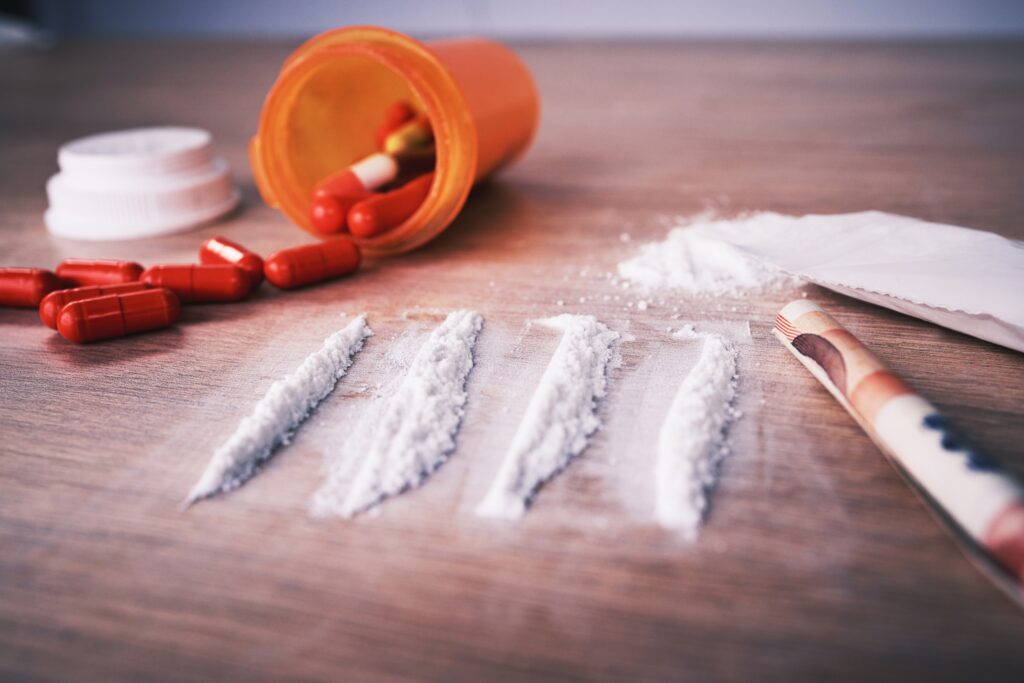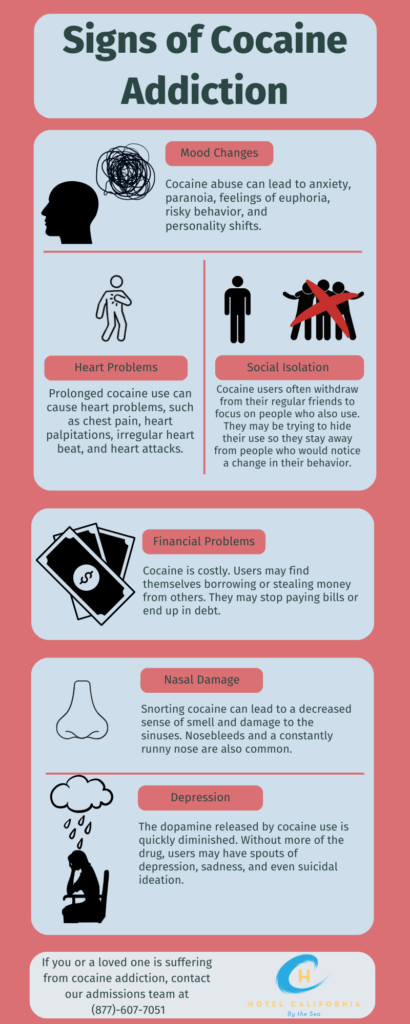Is Cocaine a Depressant Drug?
Cocaine is an additive stimulant substance that is derived from the cocoa plant and affects the brain’s dopamine system by stimulating the varying types of stimuli such as sex, food and drugs. The drug works by blocking the dopamine transporter protein, which leads to increased dopamine levels in the brain where the “feel good” sensation is amplified.

By increasing the level of dopamine in the brain, it results in producing an intense “high” and euphoria. The brain can easily adapt to this change, which prompts the user to continue rewarding these drug-seeking behaviors. The onset of effects begins quickly and ends quickly. This contributes to the user’s addiction in which they constantly need to take more drugs in order to chase the same “high.”
Is Cocaine a stimulant or depressant?
Some people ask, “is cocaine a depressant?” Cocaine is in fact, not a depressant. Cocaine is a stimulant drug. Cocaine can produce side effects such as euphoria, high energy, talkativeness, mental alertness and hypersensitivity to light, sound and touch. However, once the drug effects have worn off, users go through a period known as a “crash” in which users experience depression and extreme fatigue. These effects are similar to those of depressant drugs and might be the reason why some people confuse cocaine with a depressant drug.
The duration of the effects in the body are dependent on the method of administration. The faster the drug is absorbed into the body, the quicker the high but shorter the duration. For example, when cocaine is inhaled, it gets absorbed into the bloodstream almost immediately but only lasts between 5-10 minutes. When cocaine is snorted, it can take a little longer for the drug to be absorbed, but the effects will linger on longer between 15-30 minutes.
What is a Stimulant drug?
A stimulant substance falls under the class of drugs enhances brain activity and works to speed up messaging travel between the brain and the body. They make users feel awake, alert, confident and energetic. They work by artificially increasing the amount of the brain’s natural chemicals dopamine and norepinephrine. Stimulants are a high risk of addiction because they activate the brain’s reward system. Stimulant substances include controlled substances such as cocaine, crack, meth, and amphetamines, along with other over-the-counter drugs such as caffeine, nicotine, ephedrine and pseudoephedrine (found in allergy, cold and cough medicine).

Side effects of stimulant drugs
- Euphoria
- Increased brain activity
- High energy
- Rapid heartbeat and increased blood pressure
- Risk of heart failure
- Alertness
- Talkativeness
- Increased confidence
- Reduced appetite
- Mood swings
- Overstimulation
- Panic and paranoia
- Seizures
- Headaches
- Stomach cramps
- Aggression
- Worsening anxiety and depression
- Increased body temperature
- Tremors
- Psychosis
- Irregular breathing
Stimulant drugs also go by names such as uppers, beans, speed, and smart pills. Due to its ability to speed up the body’s messaging system, stimulant drugs are often abused to produce a sense of exhilaration, improved mental and physical performance and improved sense of overall self-esteem. However, these are only short-term side effects that wear off as quickly as the drug.
Cocaine and other stimulant drugs are highly addictive and associated with patterns of binge use. This is due to the fact that the effects of the drug wear off more quickly than types of addictive substances. Binge-using refers to consuming large doses of stimulants over a short period of time, whether it is through more frequent doses or higher doses. The most common method of administration for stimulants is through snorting or injecting.
Historically, stimulants were prescribed to treat conditions such as obesity, asthma, neurological disorders and other ailments. Today, prescription stimulants such as Adderall, Ritalin and Vyvanse are common and used to treat conditions such as attention deficit hyperactivity disorder (ADHD).
What is a depressant drug?
A central nervous system depressant drug works by slowing down activity in the brain and body. It slows down the messaging and brain activity. Depressants work by increasing the activity of the neurotransmitter known as GABA. Increasing GABA activity in the brain produces calm-like and sedative effects.
When taken in a lower dose, users can experience a sensation of euphoria. However, depressant drugs are often abused and can cause effects such as reduced inhibitions, a boost in confidence, intense relaxation and calmness. Common depressant drugs include alcohol, opioids, sleeping pills, barbiturates and benzodiazepines.
Check Your Insurance Coverage for FREE
Find out if your insurance covers addiction treatment in minutes. We accept most insurance!
Side effects of depressant drugs
- Euphoria
- Nausea and vomiting
- Mood swings
- Unconsciousness and coma
- Enhanced mood
- Reduced anxiety and stress
- Slowed reaction time
- Impaired judgment and mental functioning
- Slowed breathing, irregular breathing or respiratory depression
- Blackouts, memory loss and amnesia
- Confusion
- Slurred speech
- Loss of motor coordination
- Weakness
- Headache
- Blurred vision and dizziness
- Low blood pressure
Depressants are often prescribed to induce sleep, relieve varying types of anxiety, treat muscle spasms, PTSD, OCD and help prevent seizures. Such medications include Valium, Xanax, Ativan, Klonopin and other opioid pain medications. Benzos are generally considered safe to use as long as used per the guide and recommendation from a physician. But, like stimulants, depressant drugs can become extremely habit-forming and lead to addiction. Often referred to as downers, most depressant drugs are controlled substances with the exception of alcohol.
Signs of CNS depressant abuse
- Secretive and abnormal behaviors
- Decreased social activity or work productivity
- Mood swings
- Lack of energy or motivation
- Withdrawal symptoms
- Failing at attempts to quit the drug
Reach out to Hotel California by the Sea
We specialize in treating addiction and other co-occurring disorders, such as PTSD. Our Admissions specialists are available to walk you through the best options for treating your addiction.
Treatment for Substance Use Disorder
Stimulant drugs like cocaine and depressant drugs like heroin are extremely potent and can easily lead to dependence and addiction. Professional behavioral health programs such as Hotel California by the Sea provide clients with the highest chance of sobriety and recovery from these addictive mind-altering drugs. Our program provides specialized treatments for stimulant and depressant drug abuse. Clients will receive individualized treatment plans that provide the tools, resources and support they will need for treatment.
Our facilities provide all levels of care from detox, residential and outpatient programs. We offer unique treatment methods such as CBT, DBT and group therapy. These evidence-proven methods have helped all of our clients to better understand the root causes of their addiction and to develop more effective coping skills when addressing triggers associated with addiction. Hotel California by the Sea’s goal is to help our clients successfully achieve recovery and long-term sobriety.
References:
https://adf.org.au/drug-facts/stimulants/
https://drugfree.org/drugs/what-are-stimulants/
https://www.ncbi.nlm.nih.gov/books/NBK539896/
https://www.goodrx.com/classes/central-nervous-system-stimulants/stimulant-drugs
https://www.verywellmind.com/what-are-stimulants-2795573
https://adf.org.au/drug-facts/depressants/
https://www.dea.gov/factsheets/depressants
https://www.verywellmind.com/what-are-depressants-2795572
https://www.addictioncenter.com/drugs/drug-classifications/central-nervous-system-depressants
